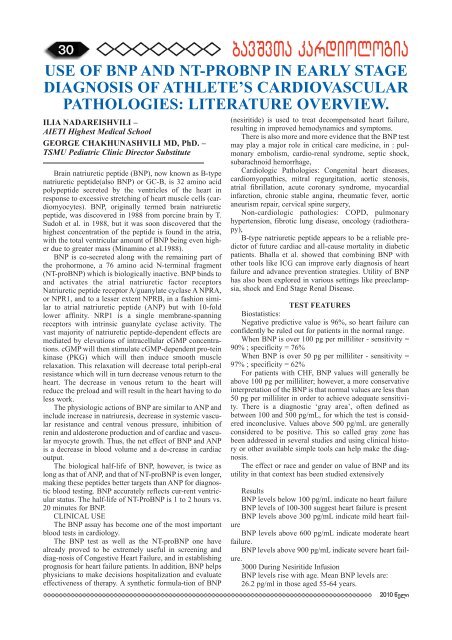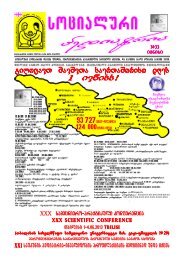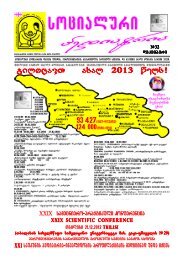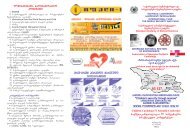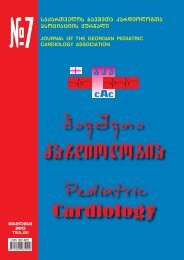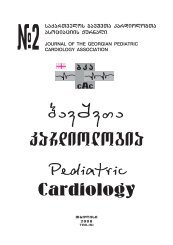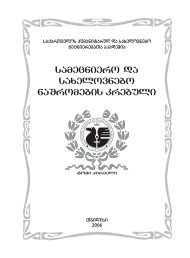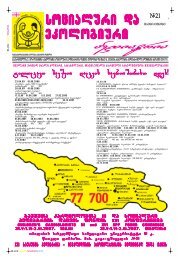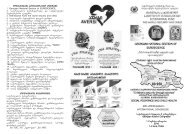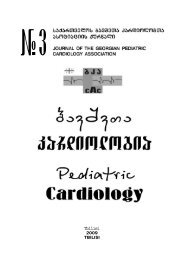You also want an ePaper? Increase the reach of your titles
YUMPU automatically turns print PDFs into web optimized ePapers that Google loves.
30 ,fdidsf rfhlbjkjubf<br />
USE OF BNP AND NT-PROBNP IN EARLY STAGE<br />
DIAGNOSIS OF ATHLETE’S CARDIOVASCULAR<br />
PATHOLOGIES: LITERATURE OVERVIEW.<br />
ILIA NADAREISHVILI –<br />
AIETI Highest Medical School<br />
GEORGE CHAKHUNASHVILI MD, PhD. –<br />
TSMU Pediatric Clinic Director Substitute<br />
Brain natriuretic peptide (BNP), now known as B-type<br />
natriuretic peptide(also BNP) or GC-B, is 32 amino acid<br />
polypeptide secreted by the ventricles of the heart in<br />
response to excessive stretching of heart muscle cells (cardiomyocytes).<br />
BNP, originally termed brain natriuretic<br />
peptide, was discovered in 1988 from porcine brain by T.<br />
Sudoh et al. in 1988, but it was soon discovered that the<br />
highest concentration of the peptide is found in the atria,<br />
with the total ventricular amount of BNP being even higher<br />
due to greater mass (Minamino et al.1988).<br />
BNP is co-secreted along with the remaining part of<br />
the prohormone, a 76 amino acid N-terminal fragment<br />
(NT-proBNP) which is biologically inactive. BNP binds to<br />
and activates the atrial natriuretic factor receptors<br />
Natriuretic peptide receptor A/guanylate cyclase A NPRA,<br />
or NPR1, and to a lesser extent NPRB, in a fashion similar<br />
to atrial natriuretic peptide (ANP) but with 10-fold<br />
lower affinity. NRP1 is a single membrane-spanning<br />
receptors with intrinsic guanylate cyclase activity. The<br />
vast majority of natriuretic peptide-dependent effects are<br />
mediated by elevations of intracellular cGMP concentrations.<br />
cGMP will then stimulate cGMP-dependent pro-tein<br />
kinase (PKG) which will then induce smooth muscle<br />
relaxation. This relaxation will decrease total periph-eral<br />
resistance which will in turn decrease venous return to the<br />
heart. The decrease in venous return to the heart will<br />
reduce the preload and will result in the heart having to do<br />
less work.<br />
The physiologic actions of BNP are similar to ANP and<br />
include increase in natriuresis, decrease in systemic vascular<br />
resistance and central venous pressure, inhibition of<br />
renin and aldosterone production and of cardiac and vascular<br />
myocyte growth. Thus, the net effect of BNP and ANP<br />
is a decrease in blood volume and a de-crease in cardiac<br />
output.<br />
The biological half-life of BNP, however, is twice as<br />
long as that of ANP, and that of NT-proBNP is even longer,<br />
making these peptides better targets than ANP for diagnostic<br />
blood testing. BNP accurately reflects cur-rent ventricular<br />
status. The half-life of NT-ProBNP is 1 to 2 hours vs.<br />
20 minutes for BNP.<br />
CLINICAL USE<br />
The BNP assay has become one of the most important<br />
blood tests in cardiology.<br />
The BNP test as well as the NT-proBNP one have<br />
already proved to be extremely useful in screening and<br />
diag-nosis of Congestive Heart Failure, and in establishing<br />
prognosis for heart failure patients. In addition, BNP helps<br />
physicians to make decisions hospitalization and evaluate<br />
effectiveness of therapy. A synthetic formula-tion of BNP<br />
(nesiritide) is used to treat decompensated heart failure,<br />
resulting in improved hemodynamics and symptoms.<br />
There is also more and more evidence that the BNP test<br />
may play a major role in critical care medicine, in : pulmonary<br />
embolism, cardio-renal syndrome, septic shock,<br />
subarachnoid hemorrhage,<br />
Cardiologic Pathologies: Congenital heart diseases,<br />
cardiomyopathies, mitral regurgitation, aortic stenosis,<br />
atrial fibrillation, acute coronary syndrome, myocardial<br />
infarction, chronic stable angina, rheumatic fever, aortic<br />
aneurism repair, cervical spine surgery,<br />
Non-cardiologic pathologies: COPD, pulmonary<br />
hypertension, fibrotic lung disease, oncology (radiotherapy),<br />
B-type natriuretic peptide appears to be a reliable predictor<br />
of future cardiac and all-cause mortality in diabetic<br />
patients. Bhalla et al. showed that combining BNP with<br />
other tools like ICG can improve early diagnosis of heart<br />
failure and advance prevention strategies. Utility of BNP<br />
has also been explored in various settings like preeclampsia,<br />
shock and End Stage Renal Disease.<br />
TEST FEATURES<br />
Biostatistics:<br />
Negative predictive value is 96%, so heart failure can<br />
confidently be ruled out for patients in the normal range.<br />
When BNP is over 100 pg per milliliter - sensitivity =<br />
90% ; specificity = 76%<br />
When BNP is over 50 pg per milliliter - sensitivity =<br />
97% ; specificity = 62%<br />
For patients with CHF, BNP values will generally be<br />
above 100 pg per milliliter; however, a more conservative<br />
interpretation of the BNP is that normal values are less than<br />
50 pg per milliliter in order to achieve adequate sensitivity.<br />
There is a diagnostic ‘gray area’, often defined as<br />
between 100 and 500 pg/mL, for which the test is considered<br />
inconclusive. Values above 500 pg/mL are generally<br />
considered to be positive. This so called gray zone has<br />
been addressed in several studies and using clinical history<br />
or other available simple tools can help make the diagnosis.<br />
The effect or race and gender on value of BNP and its<br />
utility in that context has been studied extensively<br />
Results<br />
BNP levels below 100 pg/mL indicate no heart failure<br />
BNP levels of 100-300 suggest heart failure is present<br />
BNP levels above 300 pg/mL indicate mild heart failure<br />
BNP levels above 600 pg/mL indicate moderate heart<br />
failure.<br />
BNP levels above 900 pg/mL indicate severe heart failure.<br />
3000 During Nesiritide Infusion<br />
BNP levels rise with age. Mean BNP levels are:<br />
26.2 pg/ml in those aged 55-64 years.<br />
<strong>2010</strong> weli


